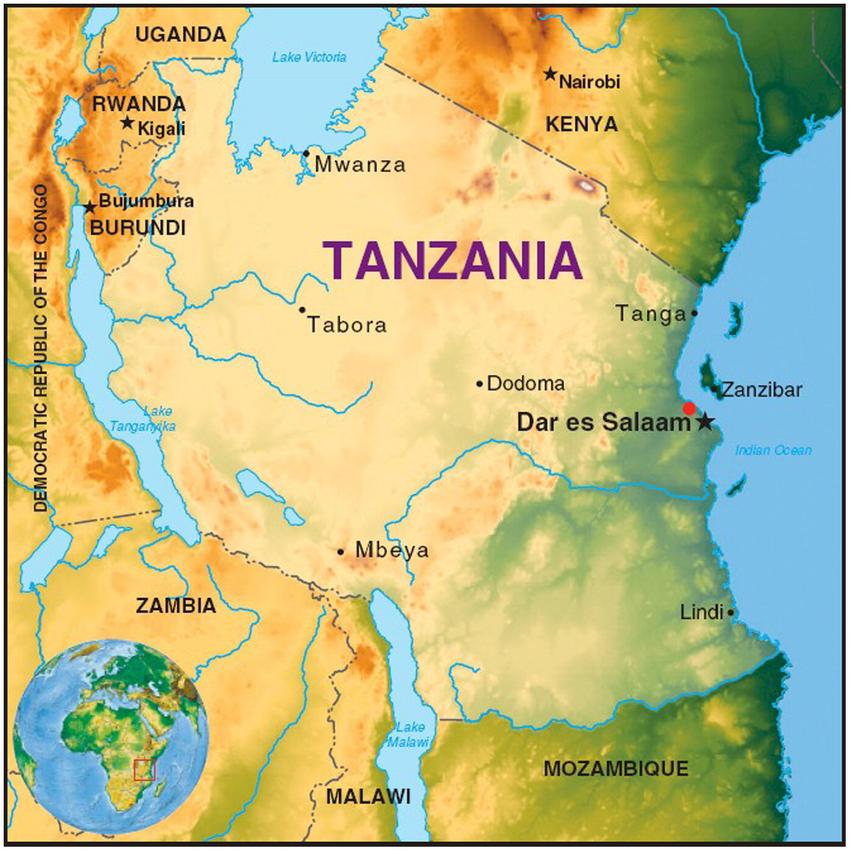Tanzania map
research gate
Tanzania, in the heart of East Africa, is charting a story of economic rise under the leadership of President Samia Suluhu Hassan. From 2021 to 2023, Tanzania has seen rapid economic growth, with investments soaring to $8.6 billion. According to a report by the Tanzania Investment Center (TIC), this impressive 173% growth is the result of continued efforts to improve Tanzania's business environment. Real GDP growth is projected to increase to 5.3% in 2023 and 6.3% in 2024 due to a sustained recovery in tourism and gradual stabilization of supply and value chains.
Mr. Hassan's approach stands in stark contrast to that of African leaders, who are characterized by cautious optimism tempered by a realistic outlook. Her leadership style, characterized by a blend of confidence and pragmatism, sets her apart in a region of mixed economic growth and uncertainty.
Such strong growth confirms that Tanzania's regulatory reform blueprint is effective, improving the business environment and attracting investors from various sectors. President Hassan's administration has been characterized by a more direct approach to attracting foreign investment, a feat few continental leaders have been able to accomplish so successfully. Her confidence in Tanzania's economic potential is clear, drawing investors from around the world to this gem of East Africa's coast. But she fully understands that stability is the basis of economic growth, and she is not afraid to talk about it. At the Women's Conference in Zanzibar in 2023, President Hassan captivated the audience with a passionate speech about Tanzania's economic advantages, citing the country's stable political situation as the main factor for its economic success. Stated. At the same conference and on other occasions, President Hassan made subtle attacks on Kenya, highlighting Tanzania's ambitions to emerge as East Africa's dominant economic power.
The number of registered projects that received investment funds increased noticeably from 455 to 575 between March 2021 and February 2023, registering a significant increase of 26%. What is even more remarkable is the distribution of these investments, with Tanzanians owning 32% of the projects, only 41% led by foreign investors, and 27% joint ventures between local and foreign companies. occupies . These investments did more than simply inject capital into the economy. Employment opportunities were also created, with the number of jobs created during the review period increasing from 61,900 to 87,187. Tanzania's industrial sector in particular has experienced significant growth, with investment soaring 49.43% in the past two years. The commercial building construction and transportation sectors also recorded impressive growth of 17.51% and 11.07%, respectively.
Another notable development in Tanzania's economic landscape is the burgeoning partnership between Tanzania and Australia, particularly in the mining and energy industries. Australian companies are pouring billions of dollars into Tanzania's mining sector, attracted by the country's lucrative business ecosystem and rich natural resources. This partnership not only reflects Tanzania's attractiveness as an investment destination, but also highlights President Hassan's proactive approach to fostering international cooperation for economic growth.
But beneath the surface diplomatic rhetoric lies fierce competition for foreign investment, market dominance and regional influence. Most African leaders are trying to shift the focus to external factors as the reasons behind the socio-economic downturn, and are instead trying to use the moment to plead for more aid. This also applies to other countries, as there is an element of protectionism in Africa's image in the world. There is a good and wise political reason for that strategy, and it is not only profitable, but also an act that creates space for the impending shadow of colonialism and imperialism in the continent's history.
Tanzania's economic recovery has been remarkable, but not without its share of obstacles. Conflict with Tanzania's East African neighbor and economic competitor Kenya looms large on the horizon, casting a shadow over the region's economic situation. Kenya's economic power and strategic position pose a formidable challenge to Tanzania's ambitions. Kenya remains a force to be reckoned with in the region, with a vibrant technology sector, strong financial markets and strategic location as the gateway to East Africa.
There are challenges within Tanzania, and President Hassan's administration is not immune to them. Lack of infrastructure, technological barriers and a lack of skilled labor threaten to derail Tanzania's economic momentum. There are also unanswered questions about sustainability. Although Tanzania's ESG strategy is unclear and not required, many economists and energy development experts believe that a strong focus on renewable energy is needed to sustain Africa's population growth and comply with United Nations sustainability goals. It is pointed out that efforts are needed.
President Samia Suluhu Hassan's leadership will be tested as Tanzania's economic trajectory continues to rise. A delicate balance of diplomacy, innovation, and strategic foresight is required to overcome conflicts, combat corruption, promote transparency, and seize opportunities. The next few years will probably be the most important for Tanzania. The country is serious about developing a strong domestic economic engine and prioritizing sustainability with the help of significant foreign investment. Despite these challenges, President Hassan has made a notable and refreshing break from it, with a degree of competitiveness and a more honest stance in the development debate.
I especially appreciate Mr. Owakera Kankwendeassisted with the research and contributed to this article.
follow me twitter Or LinkedIn. check out my website.


